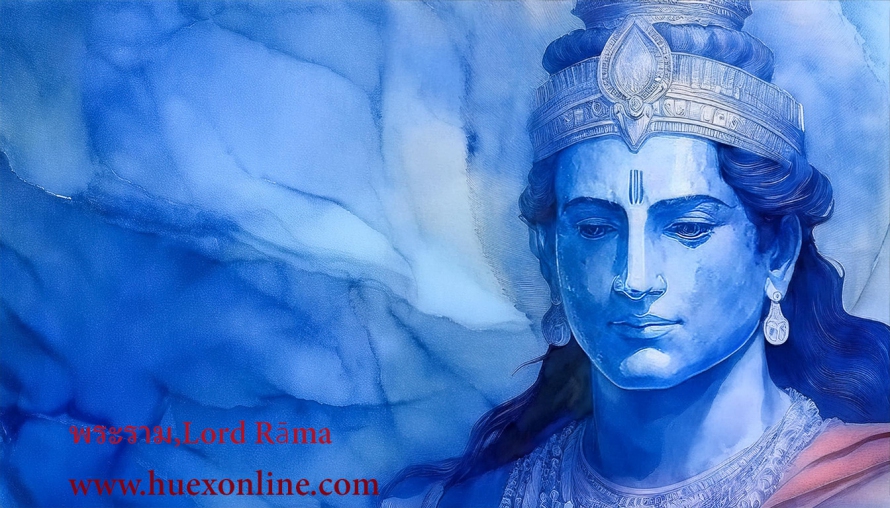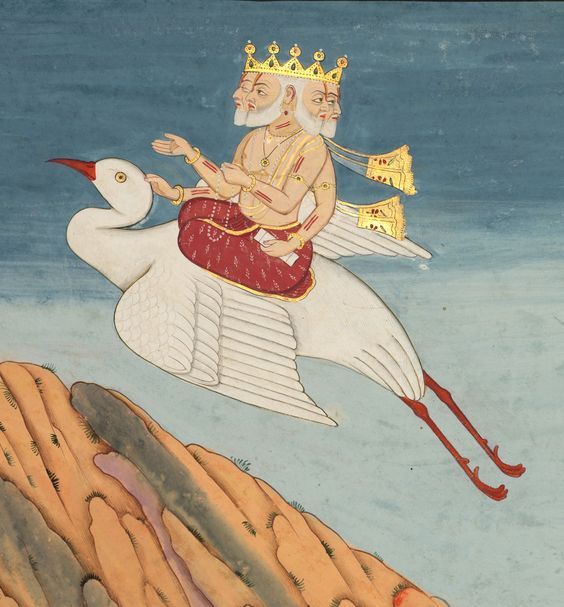Picture of Lord Rāma was developed on Aug.13, 2024.
01. Bālakāṇḍa - Sarga 1-4
First revision: Jul.16, 2024
Last change: Feb.8, 2026
Searched, gathered, rearranged, translated, and compiled by Apirak Kanchanakongkha.
1.
Page 1
Bālakāṇḍa (बालकाण्ड)
| |
Sarga (1): 79 ślokas |
|
Sarga (39): 28 ślokas |
| |
Sarga (2): 41 ślokas |
|
Sarga (40): 26 ślokas |
| |
Sarga (3): 29 ślokas |
|
Sarga (41): 24 ślokas |
| |
Sarga (4): 27 ślokas |
|
Sarga (42): 24 ślokas |
| |
Sarga (5): 23 ślokas |
|
Sarga (43): 20 ślokas |
| |
Sarga (6): 24 ślokas |
|
Sarga (44): 27 ślokas |
| |
Sarga (7): 17 ślokas |
|
Sarga (45): 22 ślokas |
| |
Sarga (8): 23 ślokas |
|
Sarga (46): 22 ślokas |
| |
Sarga (9): 32 ślokas |
|
Sarga (47): 32 ślokas |
| |
Sarga (10): 29 ślokas |
|
Sarga (48): 22 ślokas |
| |
Sarga (11): 21 ślokas |
|
Sarga (49): 25 ślokas |
| |
Sarga (12): 34 ślokas |
|
Sarga (50): 28 ślokas |
| |
Sarga (13): 46 ślokas |
|
Sarga (51): 23 ślokas |
| |
Sarga (14): 21 ślokas |
|
Sarga (52): 24 ślokas |
| |
Sarga (15): 28 ślokas |
|
Sarga (53): 23 ślokas |
| |
Sarga (16): 20 ślokas |
|
Sarga (54): 28 ślokas |
| |
Sarga (17): 39 ślokas |
|
Sarga (55): 24 ślokas |
| |
Sarga (18): 20 ślokas |
|
Sarga (56): 20 ślokas |
| |
Sarga (19): 25 ślokas |
|
Sarga (57): 23 ślokas |
| |
Sarga (20): 19 ślokas |
|
Sarga (58): 23 ślokas |
| |
Sarga (21): 19 ślokas |
|
Sarga (59): 33 ślokas |
| |
Sarga (22): 19 ślokas |
|
Sarga (60): 22 ślokas |
| |
Sarga (23): 30 ślokas |
|
Sarga (61): 27 ślokas |
| |
Sarga (24): 19 ślokas |
|
Sarga (62): 26 ślokas |
| |
Sarga (25): 22 ślokas |
|
Sarga (63): 15 ślokas |
| |
Sarga (26): 25 ślokas |
|
Sarga (64): 30 ślokas |
| |
Sarga (27): 18 ślokas |
|
Sarga (65): 27 ślokas |
| |
Sarga (28): 20 ślokas |
|
Sarga (66): 27 ślokas |
| |
Sarga (29): 23 ślokas |
|
Sarga (67): 19 ślokas |
| |
Sarga (30): 23 ślokas |
|
Sarga (68): 18 ślokas |
| |
Sarga (31): 22 ślokas |
|
Sarga (69): 32 ślokas |
| |
Sarga (32): 26 ślokas |
|
Sarga (70): 24 ślokas |
| |
Sarga (33): 20 ślokas |
|
Sarga (71): 24 ślokas |
| |
Sarga (34): 21 ślokas |
|
Sarga (72): 27 ślokas |
| |
Sarga (35): 26 ślokas |
|
Sarga (73): 22 ślokas |
| |
Sarga (36): 31 ślokas |
|
Sarga (74): 28 ślokas |
| |
Sarga (37): 24 ślokas |
|
Sarga (75): 23 ślokas |
| |
Sarga (38): 26 ślokas |
|
Sarga (76): 18 ślokas |
1.
2.
Page 2
Bālakāṇḍa - Sarga 1
1.
Nārada01 was a bull among sages, devoted to austerities and self-studying. He was an ascetic and supreme among those who were eloquent. Vālmīki asked him, ‘Right now, who in this world is valorous and possesses all the qualities? Who knows about Dharma02 and about what has been done? Who is truthful in his words and firm in his vows? Who also possesses good conduct and is engaged in the welfare of all creatures? Who is also learned and capable? Who alone is the handsome one? Who has control over himself and has conquered anger? Who is radiant and devoid of jealousy? When his anger is aroused in a battle, who are even the gods scared of? I wish to hear about all this. My curiosity is excellent. O great sage! You are the person who is capable of knowing about this kind of man. Nārada knew about the three worlds.03 On hearing these words, he was delighted.
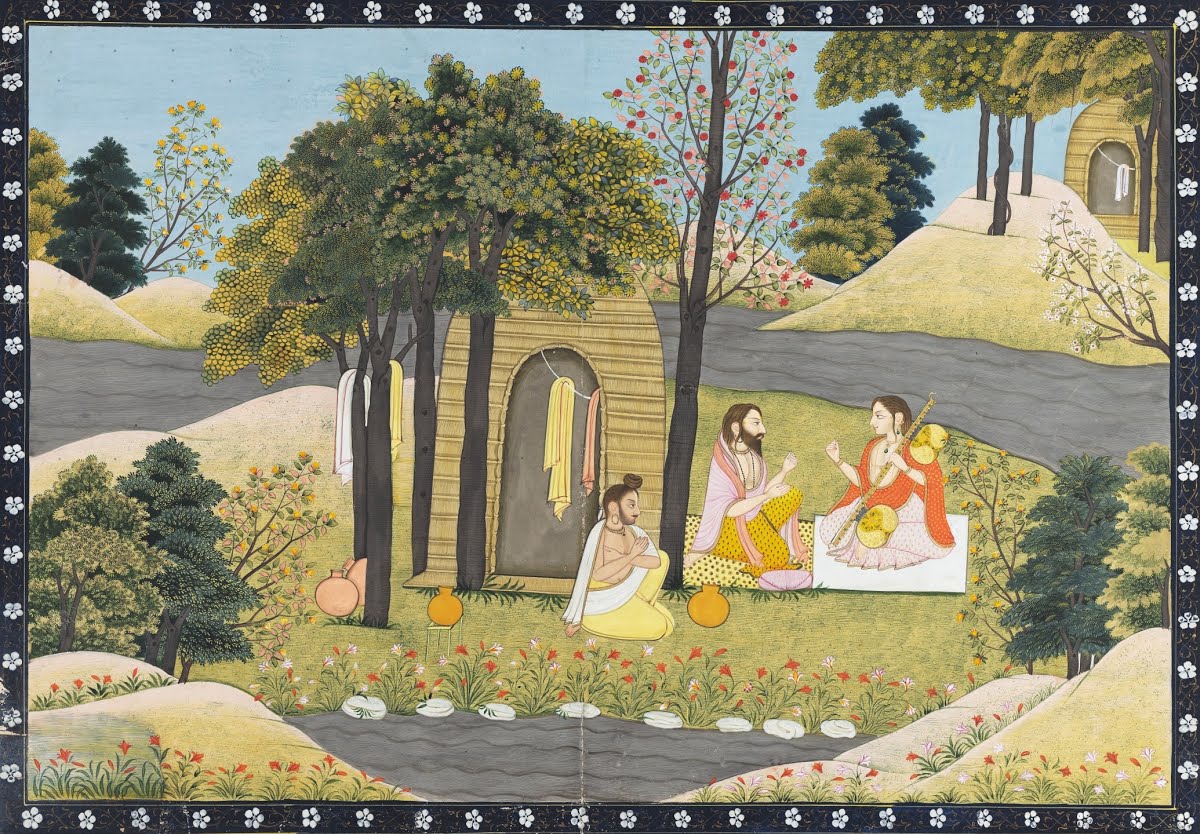
The Meeting of Sage Ṛṣi Nārada and Sage Vālmīki, source: artandculture.google.com, access date: Aug.22, 2022.1.
---------------
01. Ṛṣi Nārada Muni (नारद) is also called Ṛṣi Narad or Phra Narot (later in Thailand, there was a creator of amulets, the name was distorted to "Phra Rot" and became "Phra Rod," and it is also suitable for the Thai language which means to escape, so it is popular to call this type of amulet as Phra Rod) or Phra Narad (Na-ra-tha) is a wandering musician (the inventor of "वीणा - Veena" - gourd lute) and a storyteller, a messenger of news and ideas that create intellectual light, a son of Brahmā (ब्रह्मा), born from the psychic power of Brahmā (One of the mind-born sons of Brahmā), the first disciple of Nārāyaṇa (नारायण) and the one who reported the stories of the human world to Śiva. Ṛṣi Nārada Muni is the chief messenger of heaven and plays a significant role in the Mahābhārata and Rāmāyaṇa, as well as in the Purāṇas. In the Rāmāyaṇa, the sage advised Hanumān (हनुमान्) to use the water from his well, i.e., the saliva from Hanumān's mouth, to extinguish the fire when Hanumān went to burn Laṃka (or Lañkā - लङ्का - กรุงลงกา). In the Mahābhārata, Nārada Muni delivered the news to Kṛṣna (कृष्ण), Rāma (राम), Yudhiṣṭhira (युधिष्ठिर), and Arjuna (अर्जुन). In the Kurukṣetra (कुरुक्षेत्र) War, Nārada Muni told Rāma, "Bhīma (भीम) is fighting with Duryodhana with a club." When Aniruddha (अनिरुद्ध) disappeared, Nārada Muni informed Kṛṣna, "Aniruddha has been captured and imprisoned by the king of Bhana." And when Dhṛtarāṣṭra (धृतराष्ट्), Gāndhārī (गान्धारी), Kuntī (कुन्ती), and Vidura (विदुर) died, Nārada Muni was the one who told Duryodhana (दुर्योधन)'s weakness to Arjuna." Nārada Muni was also the one who told the story of Rāma to Ṛṣi Vālmīki, which became the epic Rāmāyaṇa. In Bollywood, especially in movies about gods, the most memorable line of Nārada Muni is "Nārāyaṇa, Nārāyaṇa." source: th.wikipedia.org and en.wikipedia.org, retrieved on 8 November 2017. and oknation.nationtv.tv, retrieved on 9 November 2017.
02. Dharma (धर्म): We will not translate the word Dharma because no word can clearly explain all its meanings, whether it is duty, good conduct, morality, ethics, governance (for the king), or abstract or spiritual. With this deep meaning, it depends on the context.
03. Heaven, Earth, and the land below. Or, in other words, Heaven, Earth, and the land between Heaven and Earth.
1.
2.
Page 3
He invited Vālmīki to listen and said, ‘O sage! The many qualities you have recounted are scarce. Using my intelligence, I will tell you about such a man. I have heard about him.01 He was born in the lineage of Ikṣvāku02, and he is known to people as Rāma (राम). He is self-controlled in his soul and immensely courageous. He is radiant, possesses grit, and is capable of controlling.03 He is intelligent and follows good policy. He is eloquent and handsome. He is a destroyer of enemies. He possesses broad shoulders and mighty arms. His neck is like a conch shell, and his cheekbones stand out. His chest is wide, and his bow is enormous. He is a subjugator of enemies, and his collarbones are hidden. His arms stretch down to his knees, and he has an excellent head and a beautiful forehead. His tread is superb. He is medium in size, and his limbs are well-proportioned. He is pleasant in complexion and powerful. His chest is muscled, and his eyes are large. He is prosperous and possesses all the auspicious qualities. He knows about Dharma. He is firm in adhering to the truth and is devoted to the welfare of the subjects. He is famous and full of learning. He is pure, controlled, and has restrained himself. He is a protector of the world of the living and is also a protector of Dharma. He knows the truth about the Vedas04 and Vedāṅgas05 and is skilled in Dhanurveda.06 He knows the truth about all the sacred texts. He is resplendent and knows the Smṛti texts.07 He is virtuous and is loved by all the people. He can discriminate and is not distressed in his soul. Just as all rivers head towards the ocean, all virtuous people approach him. He is noble08 and impartial towards everyone. He alone is the handsome one.
---------------
01. From Brahmā. Nārada recounts the core story of the Rāmāyaṇa in brief.
02. Ikṣvāku (इक्ष्वाकु), the first king og Solar (सूर्यवंश - Sūryavaṃśa) dynasty.
03. This second reference to control concerns the senses and vices.
04. The Vedas (वेद) are comprised of four vedas: Ṛg-Veda (ऋग्वेद), Sāma-Veda (सामवेद), Yajur Veda (यजुर्वेद), and Atharva Veda (अथर्ववेद).
05. The Vedāṅgas (वेदाङ्ग - Vedāṅga) is comprised of six parts of the Vedas. There are auxilaries sastras: śīkṣa (शीक्ष - phonetics or articulation and pronunciation), Kalpa (कल्प - social thought or rituals), vyākaraṇa (व्याकरण - grammar), Nirukta (निरुक्त, exposition of words, etymology), Chandas (छन्द - or Chhanda - metrics or prosody), jyotiṣa (ज्योतिष - Vedic astronomy), and additional part, alaṃkāraśāstra (अलंकारशास्त्र - the study of figures of speech).
06. Dhanurveda (धनुर्वेद) is the science of war or fighting and archery.
07. This can also be translated as possessing an excellent memory. However, the sacred texts are of two types - Śruti (श्रुति) and Smṛti (स्मृति). The texts mentioned earlier, as Rāma knows, are Śruti texts. Therefore, it seems natural to interpret this as Smṛti texts.
08. The word used is Ārya or Āryā (आर्य or आर्या).
1.
2.
Page 4
The one who extends Kausalyā’s01 lineage thus possesses all the qualities. In his gravity, he is like the ocean. In his patience, he is like the Himālayas02. He is like Viṣṇu in valor.03 He is as handsome as the moon. In his rage, he is like the fire of destruction.04 In generosity, he is like the lord of riches.05 Yet again, he is like Dharma06 in truthfulness. Rāma possesses such qualities, and the truth is his courage. He is the eldest and possesses the best of qualities. He is Daśaratha’s beloved son. In his affection, the lord of the earth wished to instate him as the heir apparent.07 His wife, Kaikeyī, saw arrangements being made for the consecration.08 The queen asked for the boons she had been granted earlier—that Rāma be exiled and Bharata be anointed. The king was bound by the sanctity of his words and by the noose of Dharma. Daśaratha banished his beloved son, Rāma. To follow his father’s instructions and do what would bring pleasure to Kaikeyī, the brave one honored the pledge and left for the forest. When he left, his beloved brother, Lakṣmaṇa, the extender of Sumitrā’s joy and full of affection and humility, followed him. Rāma’s wife, Sītā, is supreme among women and possesses all the auspicious qualities. She also followed him, like Rohini09 followed the moon.10 For some distance, the citizens and his father, Daśaratha, also followed him and then took leave of his son in Śṛṅgaverapura11 on the banks of the Gaṅgā.12 They crossed rivers full of water from one forest to another.
---------------
01. कौसल्या - Kausalyā, Rāma's mother.
02. The Himālayas - (हिमालय - Himālaya)
03. This sentence argues that the idea of Rāma as Viṣṇu's incarnation is later.
04. The fire that comes at the time of the destruction of a yuga (era).
05. Kubera (कुबेर - ท้าวกุเวร)
06. The god of Dharma.
07. Daśaratha (दशरथ) wanted to make Rāma the crown prince.
08. Daśaratha had three wives - Kausalyā, Kaikeyī, and Sumitra. Daśaratha had granted two boons to Kaikeyī earlier, boons she would redeem when the time was right. Bharata was Kaikeyī's son. Lakṣmaṇa and Śatrughna were Sumitra's sons.
09. Rohini (रोहिणी), the favorite consort of Chandra (चन्द्र), the moon god.
10. The twenty-seven nakṣtras (नक्षत्रम् - Nakṣatram) are married to the moon god, though the moon god loves Rohini (Aldebaran) more. The nakshatras are not quite stars; they can also be constellations.
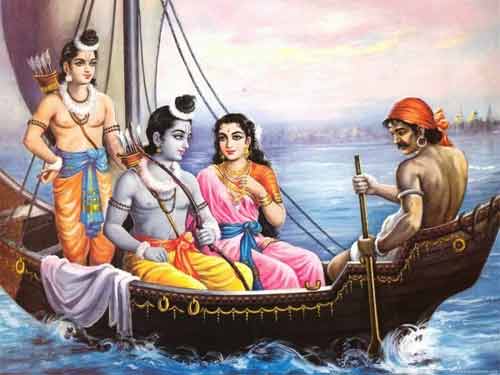 Guha arranged for a boat to take Rāma, Sītā, and Lakṣmaṇa across the river—source: www.hindu-blog.com, access date: August 20, 2024.
Guha arranged for a boat to take Rāma, Sītā, and Lakṣmaṇa across the river—source: www.hindu-blog.com, access date: August 20, 2024.1.
11. Śṛṅgaverapura (शृङ्गवेरपुर) - A sacred place. Guha (गुह), the ruler of this place, ferried Rāma and Lakṣmaṇa across the river Gaṅgā. It became a holy spot by the touch of Śrī Rāma’s feet. Now, it is called Shringverpur (Singraur), a village (near Allahabad) in Uttar Pradesh, Bhārata.
12. Gaṅgā (गङ्गा), a goddess and a great river.
1.
2.
Page 5
Finally, they arrived in Citrakūṭa01, under Bharadvāja's control.02 In that beautiful forest, the three constructed a beautiful abode and dwelt happily, like the gods and Gandharvas.03 When Rāma left for Citrakūṭa, lamenting with sorrow on account of his son, King Daśaratha went to heaven. When he died, the Brahmanas, with Vashiṣṭa04 at the forefront, wished to instate Bharata as the king, but the powerful one did not desire the kingdom. The brave one went to the forest and, falling at Rāma's feet, sought his favors.05 Bharata's elder brother repeatedly asked Bharata to return and gave him his sandals for the kingdom's sake. With his desire unsatisfied, he touched Rāma's feet. Wishing to wait for Rāma's return, he began to rule the kingdom from Nandigrāma.06 Rāma discerned that he might return there again, and so might citizens and other people. Single-minded, he entered Daṇḍaka.06 He slew the Rākṣasa07 Viradha and saw Śarabhaṅga.08 He met Sutīkṣṇa09, Agastya10, and his brother. Following Agastya's words, he received Indra's bow and arrow, a sword, and two inexhaustible quivers and was highly pleased.11 Rāma dwelt in the forest. With the other forest dwellers, all the sages approached him so that the Asuras and Rākṣasas could be slain. While he dwelt there, a Rākṣasa lady named Śūpaṇakhā,12 who resided in Janasthāna13 and could assume any form at will, was disfigured.14 Goaded by Śūpaṇakhā's word, all the Rākṣasas attacked - Khara15, Triśiras16, and the rākṣasa Dūṣaṇa17.
---------------
01. Citrakūṭa or Chitrakuta (चित्रकूट) - It is difficult to pin down Chitrakura now - it could have been in Uttar Pradesh, Madhya Pradesh, or Chhattisgarh
02. Bharadvāja (भरद्वाज), one of the great seven sages (सप्तर्षि - Saptarṣi)
03. Gandharvas (गन्धर्व - Gandharva) - Semi-divine species, companions of Kubera, celestial musicians.
04. Vashiṣṭa (वसिष्ठ), one of The Saptarṣi.
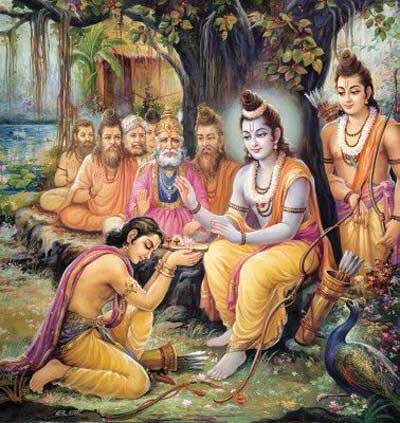 Bharata received the Rāma's sandals, source: www.hindu-blog.com, access date: Aug.23, 2024.
Bharata received the Rāma's sandals, source: www.hindu-blog.com, access date: Aug.23, 2024.1.
05. Bharata wanted Rāma to return and become king, but Rāma refused. Thereupon, Bharata returned with Rāma's sandals, which would be placed on the throne.
06. Nandigrāma (नन्दिग्राम) - it is stated in Vālmīki Rāmāyaṇa, Ayodhyākāṇḍa that while Śrī Rāma had been leading forest life, Bharata lived in Nandigrāma for twelve years worshipping the sandals of Śrī Rāma. This Nandigrāma is situated nearly fourteen miles away from Ayodhyā (अयोध्य - อโยธยา).
07. Daṇḍaka (दण्डक) or Daṇḍakāraṇya (दण्डकारण्य) - Rāma was single-minded that his exile should not be disturbed. Etymologically, the forest of Daṇḍaka, or Daṇḍakāraṇya, has a sense of punishment; that is, it is a place to which one was exiled or banished. Today, Daṇḍakāraṇya straddles several central Bhārata states.
07. Rākṣasa (राक्षस) - Demon.
08. Śarabhaṅga (शरभङ्ग) He was a great sage living in the Daṇḍaka forest. Before Rāma visited his āśrama18, Indra appeared to take the sage to the abode of Brahma world. The last wish of sage Śarabhaṅga was to meet Rāma before leaving the mortal world. After meeting Rāma and performing the necessary rites, the sage burned himself by throwing his gross body into the fire, and his divine (subtle) body rose to heaven.
09. Sutīkṣṇa or Suteekshna (सुतीक्ष्ण - สุตีกษณะ), before Rāma came to visit his āśrama, Indra invited him to visit the world of the gods. As Rāma neared his āśrama, Indra said, "I will come to see Rāma when I have completed my great task." He was the brother and disciple of Ṛṣi Agastya. He was initially called Duṣpaṇya (दुष्पण्य), was evil, but later became a good person after someone sprinkled holy water from the Gaṅgā on him.
10. Agastya (अगस्त्य) - He was one of the earliest Saptarṣi (referring to Jaiminiya Brahmana, Book 2, Adhyaya 218-221, and Gopatha Brahmana, Book 1, Adhyaya 2, Sloka 8). He was well known as a demon-conquering sage. He was a short, stocky sage, the son of Varuṇa (वरुण), and had great powers.
11. He obtained these weapons from Agastya, and Indra gave them to Agastya.
12. Śūpaṇakhā or Shurpanakha (सूर्पणखा - ศูรปณขา หรือ สำมนักขา), she is Rāvaṇa (रावण)'s younger sister.
13. Janasthāna (जनस्थान) is a place in Daṇḍakāraṇya. The place where Śūpaṇakhā's nose (and ears) were severed is identified as Nāsika (नासिक).
14. Lakṣmaṇa severed her nose and ears.
15. Khara (खर) - He was a twin brother of Dūṣaṇa and a cousin of Rāvaṇa {In Thai Version of Rāmāyaṇa (Ramakien) states that he was the younger brother of Rāvaṇa}. Rāma and Lakṣmaṇa killed him.
16. Triśiras (त्रिशिर) - He was the son of Rāvaṇa. (Ramakien states that he was the younger brother of Rāvaṇa and died from an arrow shot by Rāma.)
17. Dūṣaṇa (दूषण) - (Ramakien states that he was the younger brother of Rāvaṇa) was a twin of Khara, who ruled Daṇḍaka forest and died together with Khara.
18. āśrama (आश्रम), a place where one strives towards a goal in a disciplined manner. Such a goal could be ascetic, spiritual, yogic, or other.
1.
2.
Page 6
In the ensuing battle, Rāma slew them and their followers. He killed fourteen thousand rākṣasas. On hearing that his relatives had been killed, Rāvaṇa became senseless with rage. He summoned and sought the help of the Rākṣasa named Mārīca01. Mārīca tried to restrain Rāvaṇa several times. "O Rāvaṇa! You will not be pardoned if you oppose someone as powerful as him." Rāvaṇa, goaded by destiny, did not heed these words. With Mārīca, he went to his hermitage02. The two princes were drawn far away by the one versed in maya03. Having slain the vulture Jaṭāyu,04 he05 abducted Rāma's wife.
 The Famous portrait by Raja Ravi Varma, "Rāvaṇa cuts off Jaṭāyu's wing while abducting Sītā," is from en.wikipedia.org, and the access date is Sep.19, 2023.
The Famous portrait by Raja Ravi Varma, "Rāvaṇa cuts off Jaṭāyu's wing while abducting Sītā," is from en.wikipedia.org, and the access date is Sep.19, 2023.
On hearing about Maithilī, Rāghava was tormented by sorrow.06 He lamented, his senses distracted. In that state of grief, he cremated the vulture Jaṭāyu. While he was searching for Sītā in the forest, he saw a Rākṣasa. His name was Kabandha07. He was malformed and terrible to see. The mighty-armed one killed him. While he08 ascended toward heaven, he told him about Śabarī09, a follower of Dharma. "O Raghava! This ascetic lady is full of Dharma. Go to her." The immensely energetic one, the slayer of enemies, went to Śabarī. Śabarī properly worshipped Daśaratha's son. On the shores of the Pampa, he met the ape Hanumat.10 In Hanumat's words, he met Sugrīva11. The powerful Rāma told Sugrīva everything that had happened. In affection and full of grief, the king of the apes told Rāma everything about the enmity.12 The ape also told him about Vālin13's strength. Rāma promised that he would kill Vālin. However, Sugrīva always suspected the extent of Rāghava's valor.
---------------
01. Mārīca (मरीच) - The uncle of Rāvaṇa. A son of Sunda and Tāḍaka, set up by Rāvaṇa to take the form of a golden deer to secure Sītā, killed by Rāma.
02. Rāma's
03. Maya is the power of illusion; Mārīca used these powers to adopt the form of a deer and draw Rāma and Lakṣmaṇa away.
04. Vulture Jaṭāyu (जटायु)
05. Rāvaṇa
06. Maithilī or Maithilee (मैथिली) is Sītā, daughter of the king of Mithilā, Janaka. Videha was the kingdom, and Mithilā was the capital. Sītā is thus also known as Vaidehi (वैदेही - ไวเดหิ). Raghu (रघु - ราฆุ) was one of Rāma's ancestors. Hence, Rāma is referred to as Rāghava (राघव - ราฆพ).
07. Kabandha (कबन्ध), a Rākṣasa with "headless body".
08. Kabandha
09. Śabarī or Shabaree (शबरी), A woman of the tribe of forest-dwellers. Śrī Rāma, during his life in the forest, gave her salvation. Śabarī, in her former life, was the only daughter of Mālinī of the Gandharva King, Citrakavaca. An erudite scholar, Vītihotra, married her. As he was ever immersed in contemplation of Brahman, his wife Mālinī (later Śabarī) kept one hunter, Kalmāṣa, as her paramour, and her husband cursed her thus: "As you have become a lover of the hunter, you turn out to be a hunter-woman."
10. Hanumat (हनुमत्)
11. Sugrīva (सुग्रीव)
12. The enmity between Vālin13 and Sugrīva.
13. Vālin (वालिन्) or Valin or Vali or Bāli - Vālin and Sugrīva were the two sons of Ahalyā (अहल्या), wife of Gautama ṛṣi. Without knowing her ascetic husband, she conceived secretly and gave birth to two sons, Vālin, the elder, by Indra, and Sugrīva, the younger, by Sūrya. Tārā was the most beloved wife of Vālin and Aṅgada (अङ्गद), a fruit of their union. In the Tattvasaṃgraha Rāmāyaṇa, the story is that Vālin, monkey king of unmatched energy, son of Ahalyā and Indra, went to the spot where the churning of the ocean was going on. On seeing the fatigue of the gods, Viṣṇu requested Indra to persuade his son to help the gods in their act. When Indra did accordingly, Viṣṇu decorated the Monkey King Vālin with a necklace of divine golden lotuses and showered upon him many blessings, amongst which one was that he would always be invincible in duels because half of the energy of his adversary would go to him. Filled with joy with such unexpected honors, Vālin took both ends of the snake to agitate the mountain. (Tattvasaṃgraha Rāmāyaṇa, Kiṣkindhā-khaṇḍa, 5)
1.
2.
Page 7
Dundubhi's gigantic skeleton was there.01 Rāghava used the big toe on his foot to fling these ten yojanas away to establish credibility.02 Yet again, with one single and large arrow, he pierced seven sala trees.03 he also dispatched a mountain to the nether regions to generate confidence. After this, the giant ape was assured and delighted in his mind. He went with Rāma to Kiṣhkindhā04 and the mouth of the cave.
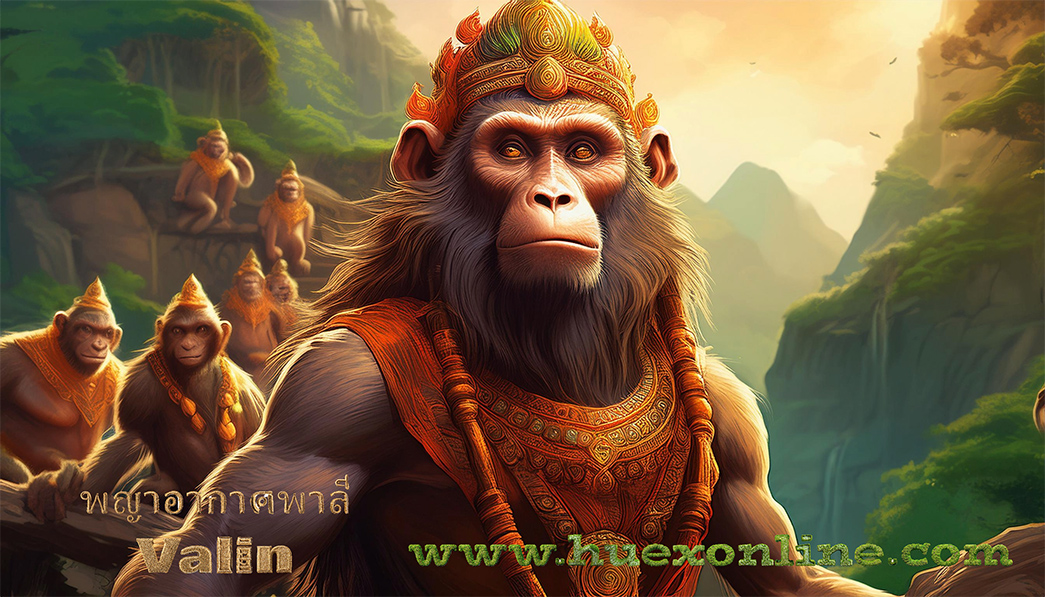 Picture of Vālin was developed on Sep.6, 2024.
Picture of Vālin was developed on Sep.6, 2024.1.
Sugrīva, supreme among apes and golden brown in complexion, started to roar there. On hearing this roar, the lord of the apes05 emerged. Following Sugrīva's words, he killed Vālin in the encounter. Rāghava returned the kingdom to Sugrīva and instated him there. The bull among apes summoned all the apes. He sent them to search for Janaka's daughter in all directions. The strong Hanumat heard the words of the vulture, Saṃpāti.06 He leaped over the salty ocean that extended for one hundred yojanas. He reached the city of Lanka, ruled by Rāvaṇa. He saw Sītā meditating in the forest of Ashoka. To establish Vaidehi's confidence, he gave her the sign07 he had been given. He comforted her and broke down the gate. He killed five foremost commanders and seven sons of ministers. Having crushed the brave Aksha, he allowed himself to be captured. Because of a boon from their grandfather,08 knew he could free himself from any weapon. However, the brave one wished to tolerate the rākṣasas and those who captured him. Except for Maithilī Sītā, he burnt down the city of Lañkā. The giant ape returned to bring Rāma pleasure and give him the news. Having reached, he circumambulated the great-souled Rāma. The one whose soul is immeasurable reported how he had seen Sītā. With Sugrīva, he09 went to the shores of the great ocean.
---------------
01. Dundubhi, a gigantic demon in the form of a buffalo, is killed by Vālin.
02. A yojana is between 8 and 9 miles away.
03. A large tree, Shorea robusta.
04. The kingdom of the apes.
05. Vālin.
06. Jaṭāyu's elder brother.
07. Rāma's ring.
08. Brahma.
09. Rāma
1.
2.
Page 8
He agitated the ocean with arrows like the sun's rays. The ocean, the lord of the rivers, showed himself. On the words of the sea, he01 asked Nala02 to construct a bridge. Using this, he went to the city of Lañkā and killed Rāvaṇa in the battle. He instated Vibhīṣaṇa03, Indra among rākṣasas, in the kingdom of Lañkā. Because of the great-souled Rāghava's deeds, the mobile and immobile objects in the three worlds and the gods and the sages were satisfied. Supremely content, all the gods worshipped him. Having accomplished his task, Rāma was delighted and devoid of anxiety. He revived all the slain apes after obtaining a boon from the gods.
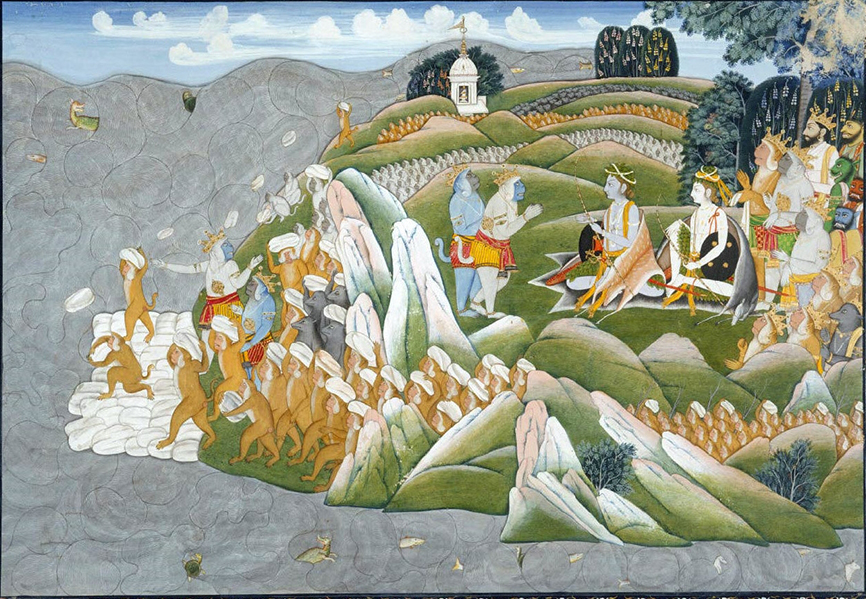 Right: Nala (white monkey with blue face) and Nīla (blue monkey) talking with Rāma. Left: Nala and Nīla direct the monkeys to place the stones in the ocean. Made in Kangra, Himachal Pradesh, Bhārata - Philadelphia Art Museum, source: en.wikipedia.org, access date: Sep.8, 2024.
Right: Nala (white monkey with blue face) and Nīla (blue monkey) talking with Rāma. Left: Nala and Nīla direct the monkeys to place the stones in the ocean. Made in Kangra, Himachal Pradesh, Bhārata - Philadelphia Art Museum, source: en.wikipedia.org, access date: Sep.8, 2024.1.
Ascending Puṣpaka,04, he left for Nandigrāma. In Nandigrāma, with his brothers, the unblemished one removed his matted hair. Rāma got Sītā back and also brought back his kingdom. The people are joyous and delighted. Those who are scrupulous in following Dharma are nurtured. There is recovery from disease. There are no famines, and everything is devoid of fear. No man has to witness the death of his son. Women are not ignoble and never become widows. They are devoted to their husbands. There is no fear of the wind. Creatures never get submerged in water. There is no fear of fire. It is precisely as it was in Kṛta Yuga.05 He performs one hundred horse sacrifices and gives away a lot of gold. Following the appropriate ordinances, he gives away crores of cattle to the learned. Rāghava will establish one hundred royal lineages that possess all the qualities. In this world, he will engage the four Varṇas06 in their respective tasks. Rāma will thus honor the kingdom for eleven thousand years and then go to the Brahma's world.
'This is a sacred account and destroys all sins. It is encouraging and in conformity with the Vedas. If a person reads about this conduct, he is cleansed of all sins.
---------------
01. Rāma
02. Nala
03. Vibhīṣaṇa (พิเภก) - Rāvaṇa's younger brother.
04. Puṣpaka, a celestial vehicle, vimāna (विमान). This belonged originally to Kubera but was seized by Rāvaṇa.
05. Kṛta Yuga (कृतयुग), see page 5 The Puranas 1.
06. Varṇa (वर्ण), mainly comprises of Brāhamaṇas (ब्राह्मण - Brāhamaṇa), Kṣatriyas (क्षत्रिय - Kṣatriya), Vaiśyas (वैश्य - Vaiśya) and Śūdras (शूद्र - Śūdra).
1.
2.
Page 9
A man who reads the account of the Rāmāyaṇa has a long life with his sons, grandsons, and followers. After death, he obtains greatness in heaven. A Brāhmaṇa who reads this becomes eloquent in speech, a Kṣatriya obtains lordship over land, a merchant01 obtains the fruits of trading and a Śūdra person obtains greatness.'
---------------
01. That is, a Vaiśya.
1.
2.
3.
Bālakāṇḍa - Sarga 2
1.
Hearing Nārada's words, who was accomplished in speech, the great sage,02 with Dharma in his soul, worshipped him, accompanied by his disciple. Having been appropriately worshipped, the celestial sage, Nārada, took his leave and departed through the sky03 to the world of the gods. After some time had passed,04 the sage went to the banks of the Tamasā05, not very far from the Jahnavī.06 The great sage reached the banks of the Tamasā. With his disciple standing next to him, he saw that this tīrtha07 was free from all mud.08 He said, 'O Bharadvāja!09 Look. This tīrtha is free from all mud. It is beautiful, and the waters are pleasing, like the minds of various men. O son!10 Place the water pot here and give my garment made of bark. I will immerse myself in this supreme tīrtha of Tamasā.' Bharadvāja was thus addressed by the great-souled Vālmīki. Controlled and attentive towards his preceptor, he gave the sage the garment made of bark. The one who had controlled his senses received the garment made of bark from his disciple.
---------------
02. Vālmīki.
03. Alternatively, left for heaven.
04. The text uses the word muhūrta (मुहूर्त). It is a measure of time. More specifically, it is forty-eight minutes or 1/30 of a day.
05. Tamasā (तमसा), a sacred river. People of Bhārata were using the water of this river for drinking. (Śloka 3, Adhyāya 9, Bhīṣma Parva, Mahābhārata). The famous āśrama of Vālmīki was on the banks of this river. This place was the scene of the well-known episode of the Krauñca birds and the famous curse of Vālmīki beginning with 'Mā niṣāda' (Bāla Kāṇḍa, Sarga 2, Vālmīki Rāmāyaṇa). A tributary that flows through Madhya Pradesh and Uttar Pradesh. Vālmīki's hermitage was on the banks of the Tamasā.
06. Jahnavī (जाह्नवी) is the Gaṅgā.
07. tirtha or tīrtha (तीर्थ - ตีรถะ), a "crossing place (transition or junction), ford.".
08. A tīrtha is a sacred place of pilgrimage with water where one can have a bath.
09. Bharadvāja (भरद्वाज) - Vālmīki's disciple.
10. The word used is tata ( तत ). Though it means son, it is affectionately used for anyone younger or junior [source: 02]. But in the Ṛgveda and later, Tata (तत, ‘dada’) is the pet name for ‘father’ Tāta and Pitṛ.
1.
2.
Page 10
He advanced, glancing in every direction at the great forest.
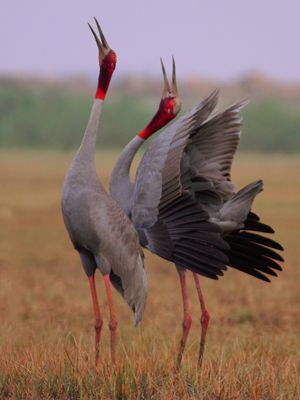 A pair of Sarus cranes, source: savingcranes.org via pinterest.com, access date: Oct.1, 2024.
A pair of Sarus cranes, source: savingcranes.org via pinterest.com, access date: Oct.1, 2024.1.
Near the spot, the illustrious one saw a couple of Sarus cranes01 wandering around, attached. The sound they made was beautiful. There was a Niṣāda02 who bore evil intent towards those who resided there. While he looked on,03 he killed the male one from that couple. Limbs covered with blood trembled on the ground. On seeing it slain, the wife lamented in piteous tones. The sage had dharma in his soul. He saw that the hunter brought down the bird and was moved by compassion. Full of compassion and on seeing the female curlew that was weeping, the Brāhamaṇa recognized this as adharma. He spoke these words. 'O niṣāda! This couple of Sarus cranes was in the throes of passion, and you killed one of them. Therefore, you will possess ill repute for an eternal number of years.'04 Having said this, a thought arose in his heart. 'Overcome by sorrow on account of the bird, what have I uttered?' The intelligent and immensely wise are reflected in this. Having made up his mind, the bull among sages spoke these words to his disciple. 'While I was overcome by grief, these words emerged. They have rhythm and metre and are arranged in padas with an equal number of Akṣaras05. This and nothing else will be a śloka.'06 The sage spoke these supreme words to his disciple, and he accepted them cheerfully. The preceptor was also content. Following the prescribed rites, the sage performed his ablutions in that tīrtha. He returned, thinking about the purpose of what had transpired. Bharadvāja, the humble and learned disciple, followed his preceptor at the rear, having filled the water pot.
---------------
01. Some say that The Krauñca or krouncha bird, some say that curlew, and some say that Sarus crane (Sarus Crane, Sarus Crane Grus Antigone, Sarus from Sanskrit, sārasa meaning bird of the lake), which has a redhead, is found in the Thai crane and can be found in Bhārata. It is generally about 2 meters high, has a wingspan of 2.5 meters, and weighs about 6.8-8 kilograms.
02. Niṣāda or Nishada (निषाद) - Hunter who dwelt in mountains and forests.
03. Vālmīki looked on.
04. This celebrated verse (śloka) is regarded as the beginning of Sanskrit poetry.
05. Akṣara or akshara (अक्षर) - A letter of the alphabet.
06. There is an implied pun on the etymology of the word shloka, from śoka (sorrow). Sanskrit poetry has different kinds of metres. This particular one is known as anuṣṭúbh (अनुष्टुभ् - อนุษฺฏุภฺ). An akshara is not quite a syllable, but a syllable is a good enough approximation. Pada means a quarter and an anuṣṭúbh śloka possesses four padas, with eight syllables in each pada. That celebrated verse has these attributes.
1.
2.
Page 11
The one who knew about dharma entered the hermitage with his disciple. Seating himself, he conversed about other things but continued to meditate on what had happened. The lord Brahma, the creator of the worlds, himself arrived there. The immensely energetic one, with four faces, came to see the bull among sages. Seeing him, the self-controlled Vālmīki was at a loss for words.
Brahma, source: www.pinterest.com, access date: Mar.25, 2024.
1.
Supremely astounded, he quickly arose and joined his hands in salutation. He worshipped the god and honored him with padya, arghya, and a seat.01 Having properly prostrated himself, he asked him about his welfare. Worshipped in this beautiful way, the illustrious one seated himself. He instructed the great sage, Vālmīki, to also be seated. In the presence of the grandfather of the world himself, Vālmīki sat down, his mind still meditating on what had happened. 'His intelligence clouded by enmity, that evil-souled one02 created a hardship. Without any valid reason, he killed a curlew that sang in such beautiful tones.' He was again overcome by sorrow on account of the curlew. Full of sorrow, in his mind, he again chanted the śloka. Brahma smiled at the bull among sages and said, 'You have composed a structured śloka. There is no need to think about this. O Brāhmaṇa! The metre and the speech arose from me. O supreme among sages! This was so that you could recount Rāma's conduct in its entirety. In this world, the intelligent Rāma possesses all the qualities and has dharma in his soul. He possesses fortitude, and you have heard about his conduct from Nārada, everything that the intelligent Rāma did, openly and in secret, with Sumitrā's son (Lakṣmaṇa), and all that concerns the rākṣasas. You know about Vaidehī's conduct, whether it has been revealed or is a secret. All that is unknown will also become known to you. In the Kāvya03 you compose, not a single word will be false, and there will be nothing that will not happen. Structured and beautiful ślokas compose the optimistic account of Rāma's conduct. As long as there are mountains and as long as there are rivers on this earth, till such a time, this Rāmāyaṇa account will circulate in the worlds.04
---------------
01. These are objects always offered to a guest: padya (water to wash the feet), achamaniya (water to wash the mouth/face), arghya (gift), and asana (a seat).
02. The hunter.
03. Kāvya (काव्य) - A long poem.
04. Literally, Rāmāyaṇa means Rāma's progress (अयन - āyaṇa).
1.
2.
Page 12
As long as Rāma's account, composed by you, circulates, till that time, you will reside in the upper regions, the nether regions, and even in my world.' Having spoken these words, the illustrious Brahma vanished. With his disciple, the sage, Vālmīki, was struck by great wonder. All the disciples again chanted the śloka.
Cheerful and extremely surprised, they chanted it repeatedly. It was chanted by the great sage in four pādas, with an equal number of akṣaras in each. Because of repeated recitation and because it emerged from sorrow, it came to be known as a śloka.01 Thus, intelligence came to Vālmīki, and thinking about it in his mind, he composed the entire Rāmāyaṇa kāvya. He decided that this was what he should do. In beautiful pādas, the broad-minded and illustrious one composed the account of the illustrious Rāma's conducts, with an equal number of akṣaras in hundreds of ślokas. The generous and intelligent sage composed a kāvya that brought him fame.
---------------
01. There is the implication that something becomes a śloka when it is recited by others, not just the composer.
1.
2.
3.
Bālakāṇḍa - Sarga 3
1.
Having heard everything about the intelligent one's02 conduct, which conformed with Dharma, the one with Dharma in his soul again sought out all that was known about this. Following Dharma, the sage touched water,03 joined his hands in salutation and stood on a mat of darbha04 grass, facing the east. he sought a chart for progress.05 The birth of the extremely brave Rāma, who showed his favors towards everyone, was loved by the worlds, his perseverance, amiability, and devotion to the truth;
---------------
02. Rāma's. Having heard from Nārada.
03. Water is touched before an auspicious act.
04. Darbha (दर्भ - ดารภะ) - Sacred grass. It is not clear whether he stood or seated himself.
05. What follows is a description of what is in the Rāmāyaṇa. The sentence is incomplete (without a subject and verb), not unusual in Sanskrit.
1.
2.
Page 13
the many other beautiful deeds with Viśvāmitra as an aide, the shattering of the bow and the marriage with Jānakī; the dispute between Rāma and Rāma01 and the qualities of Daśaratha's son, Rāma's consecration and Kaikeyī's evil intentions; the obstacle created for the consecration and Rāma's exile, the miserable lamentations of the king02 and his departure for the world hereafter; the sorrow of the ordinary subjects and the separation from the ordinary subjects, the conversation with the king of Niṣādas03 and the charioteer's return; the crossing of the Gaṅgā and the meeting with Bharadvāja, having obtained Bharadvāja's permission, their sight of Citrakūṭa; the construction of an abode and Bharata's arrival there to seek Rāma's favors, the performance of the water rites for the father; the consecration of the sandals and the residence in Nandigrāma, the departure of Daṇḍakāraṇya and the meeting with Sutīkṣṇa; Anasūyā's problem and the granting of an ointment for the body, the conversation with Śūpaṇakhā and her disfigurement; the slaying of Khara and Triśiras and Rāvaṇa's rise,04 the slaying of Mārīca and Vaidehī's abduction; Rāghava05 's lamentations and the slaying of the king of the vultures, the sighting of Kabandha and the sighting of Pampa; the sighting of Śabarī and the sighting of Hanumat, the lamentations of the great-souled Rāghava in Pampa; the departure of Ṛṣyamūka and the meeting with Sugrīva, the generation of friendship between the two and the conflict between Vālin and Sugrīva; the crushing of Vālin and the bestowal on Sugrīva06, Tārā's lamentations and the agreement to reside there until the monsoon nights were over; the rage of the Rāghava lion07 and the gathering of the army, the departure in various directions and a description of the earth; the gift of the ring and the sighting of the bear's den,their fasting to death08 and their sighting of Saṃpāti;
---------------
01. Paraśurāma or Parashurama (परशुराम).
02. Daśaratha (दशरथ).
03. Guha.
04. A consequent rise in Rāvaṇa's wrath.
 Dattātreya (The son of sage Atri and Anasūyā), source: www.pinterest.com refer to hinducosmos.tumblr.com, access date: Feb.10, 2024.
Dattātreya (The son of sage Atri and Anasūyā), source: www.pinterest.com refer to hinducosmos.tumblr.com, access date: Feb.10, 2024.1.
05. Rāghava (राघव - ราฆพ) - A descendant of Raghu, especially Rāma.
06. The kingship of the apes.
07. At Sugrīva's delay.
08. Because the apes had not been able to find Sītā.
Notes and Narratives:
01. Tārā (तारा - star - นางดารา) - In the Hindu epic Rāmāyaṇa, Tārā (Sanskrit: तारा, Tārā, lit. 'star') is the Queen of Kiṣhkindhā and the wife of the vānara (monkey) King Vālin. Tārā is described as the daughter of the vānara physician Suṣeṇa in the Rāmāyaṇa, and in later sources, as an apsara (अप्सरस् - celestial nymph) who rises from the churning of the milky ocean. She marries Vālin and bears him a son named Aṅgada (अङ्गद - องคต). After Vali is presumed dead in a battle with a demon, his brother Sugrīva becomes king, however, Vālin returns and exiles his brother, accusing him of treachery. When Sugrīva challenges Vālin to a duel, Tārā wisely advises Vālin not to accept because of the former's alliance with Rāma—the hero of the Rāmāyaṇa and an avatar of the god Viṣṇu—but Vālin does not heed her, and dies from Rāma's arrow, shot at the behest of Sugrīva. The Rāmāyaṇa and its later adaptations emphasize Tārā's lamentation. While in most vernacular versions, Tārā casts a curse on Rāma by the power of her chastity, in some versions, Rāma enlightens Tārā. Sugrīva returns to the throne but spends his time carousing and fails to act on his promise to assist Rāma in recovering his kidnapped wife, Sītā. Tārā now, chief diplomat—is then instrumental in reconciling Rāma with Sugrīva after pacifying Lakṣmaṇa, Rāma's brother, who was about to destroy Kiṣhkindhā in retribution for Sugrīva's perceived treachery. After this incident, Tārā is only mentioned in passing references, as the story moves from Kiṣhkindhā to the climactic battle in Lañkā to retrieve Sītā. Tārā's intelligence, presence of mind, courage and devotion to her husband Vālin is praised. She is extolled as one of the Pañcakanyā (पञ्चकन्या - five [revered] women - Ahalyā, Draupadī, Kunti, Tārā, and Mandodarī), the recital of whose names is believed to dispel sin.
1.
2.
Page 14
the ascent of the mountain and the leap across the ocean, the solitary entry into Lañkā in the night01 and thinking about what should be done, the visit to the liquor room and an examination of the fortifications, the visit to Aśoka forest and the sighting of Sītā; the giving of the sign02 and Sītā's address, the censure of the rākṣasa ladies and Trijaṭā's nightmare; Sītā's gift of the jewel and the destruction of the trees, the driving away of the rākṣasa ladies and the slaying of the guards; the capture of the son of Vayu,03 his roaring and the burning down of Lañkā, the seizure of the honey on the leap back; the presentation of the jewel and the assurance of Rāghava, the meeting with the ocean and Nala's construction of the bridge; the crossing of the ocean and the siege of Lañkā in the night, the meeting with Vibhīṣaṇa and the recounting of the method of killing;04 the slaying of Kumbhakarṇa and the crushing Meghanāda, Rāvaṇa's destruction and the regain of Sītā in that city of enemies; the instatement of Vibhīṣaṇa and the sighting of Puṣpaka, the departure for Ayodhya and the meeting with Bharata; and the disbandment of all the soldiers and arrangements for Rāma's crowning, the delight brought to his own kingdom and Vaidehī's exile. In this kāvya, the illustrious ṛṣi Vālmīki described everything that happened as long as Rāma was on earth and all that would occur in the future, thereafter.05
---------------
01. By Hanumat.
02. The ring.
03. The wind god, Hanumat, was Vayu's son.
04. Vibhīṣaṇa explained how Rāvaṇa could be killed.
05. After Rāma had left Earth.
1.
2.
3.
Bālakāṇḍa - Sarga 4
1.
When Rāma obtained his kingdom, the illustrious ṛṣi Vālmīki, in control of his soul, composed the entire account of his conduct in wonderful Padas (पद - บท). The immensely wise one recounted what happened and what would transpire afterward.
1.
2.
Page 15
Having composed it, the lord thought about who would recount the tale. While the great sage was thinking about this in his mind, in the garb of sages, Kuśa and Lava knew about Dharma. He saw that the two brothers, residents of the Hermitage, possessed melodious voices. He saw that these two intelligent ones were accomplished in the Vedas. Since this only served to extend the Vedas, the lord gave this to them, the entire Rāmāyaṇa kāvya and Sītā's greatness of character. The sage who was devoted to these vows told them about Paulastya's01 death. This will be read and sung in pleasant tones, categorized into three scales and seven notes.02 It possesses a rhythm that can be adjusted to the tunes of stringed instruments. This kāvya is sung in hasya, shringara, karunya, roudra, veera, bhayanaka, beebhatsa and other rasas.03 They04 possessed the knowledge of the Gandharvas05 and were accomplished in pausing and pitching their voices. Those two brothers had melodious voices and looked like the Gandharvas. They possessed beauty and the auspicious signs. They were sweet in speech. Having emerged from Rāma's body, they were like two mirror images of him. The kāvya was a supreme account and devoted to Dharma, those two princes learnt it in its entirely, reciting it in the proper way, without any blemishes. Those two great-souled and immensely fortunate ones were seen to posses all the qualities and knew about the truth. Controlled, and as instructed, they sang this in assemblies of sages, Brāhmaṇas and the virtuous. On one occassion, they were seated in a gathering of sages, cleansed in their souls. They sung the kāvya in their presence. On hearing this, all the sages had tears in their eyes.
---------------
01. Rāvaṇa's. Paulastya (पौलस्त्य) - An epithet of Rāvaṇa.
02. Svara (स्वर) (note, sound, noise) can be in seven tones - Ṣaḍja (षड्ज), Ṛṣabha (ऋषभ), gandhara (गान्धार), madhyama (मध्यम) , panchama (पंचम), dhaivat (धैवत) and nishada (निषाद), commonly known as sa-re-ga-ma-pa-dha-ni (सा - रे - गा - म - प - ध - नि). The three scales are udātta (उदात्त - high), anudātta (अनुदात्त - low - That tone which is not highly accented) and svarita (accented).
03. There are nine rasas (emotions) in aesthetics - shringara (romance), hasya (comedy), karunya (compassion), roudra (ferocity), beebhatsa (disgusting), bhayanaka (horrible), veera (heroic), adbhuta (wonderful) and shanta (peaceful). However, other rasas are also sometimes mentioned.
04. Kuśa and Lava.
05. Singing, dancing, and music.
1.
2.
Page 16
They were filled with great wonder and uttered words of praise. All the sages, devoted to Dharma, were delighted. They praised the singing of Kuśa and Lava, who deserved to be praised. 'Wonderful! This song, in particular the ślokas, are melodious. Although all this happened a long time ago, it is as if we have witnessed it now. Those two immersed themselves in it and sung it in accordance with the sentiments. Accomplished in a wealth of svaras, they sang together, melodiously and with affection.' The great sages, who could pride themselves on their austerities, praised those two in this way. They sang in beautiful tones, full of deep meaning and affection. Delighted, a sage who was there gave them a water pot. Delighted, another extremely illustrious sage gave them garments of bark. The account composed by the sage01, arranged in successive sections, was extraordinary and would be a foundation for poets who would come in the future.
Those two singers were praised everywhere. On one occassion, while they were thus singing on the royal road, Bharata's elder brother02 saw them. Rāma, the slayer of enemies, honoured the the two brothers, Kuśa and Lava, who deserved to be praised, and brought them to his own abode. The lord, the scorcher of enemies, seated himslef on a golden and divine throne. His advisers and brothers were seated around him. Rāma saw those two handsome ones, with veenas,03 and spoke to Lakṣmaṇa, Śatrughna, and Bharata. 'They are as radiant as the gods. Let it be properly sung by these two, who possess melodious voices. These two sages, Kuśa and Lava, bear all the marks of kings, but are great ascetics. Listen to the great account they speak about. It brings prosperity even to me.' Those two were accomplished in the different techniques and modes of singing. Urged by Rāma., they sang. And in that assembly, Rāma was also gradually immersed in their narration.
---------------
01. Vālmīki.
02. Rāma.
03. veenas also called vīṇā (वीणा - วีณา), Stringed musical instrument.
1.
References:
01. from. Debroy, Bibek. The Valmiki Ramayana: Vol. 1. Penguin Random House India Private Limited. Kindle Edition.
02. from. Debroy, Bibek. The Valmiki Ramayana: Vol. 1. Penguin Random House India Private Limited. ISBN 9780143428046, First Publishing, 2017. Haryana, Bhārata.
03. from. "The Illustrated Ramayana: The Timeless Epic of Duty, Love, and Redemption," ISBN: 978-0-2414-7376-4, Penguin Random House, 2017, Printed in Mainland China, www.dk.com.
04. from. "The Rāmāyaṇa of Vālmīki - THE COMPLETE ENGLISH TRANSLATION," translated by Robert P. Goldman, Sally J. Sutherland Goldman, Rosalind Lefeber, Sheldon I. Pollock, and Barend A. van Nooten, verified by Robert P. Goldman and Sally J. Sutherland Goldman, ISBN 978-0-6912-0686-8, 2021, Princeton University Press, printed in United States.
05. from. HTTP://www.wisdomlib.org.
1.
2.
3.


